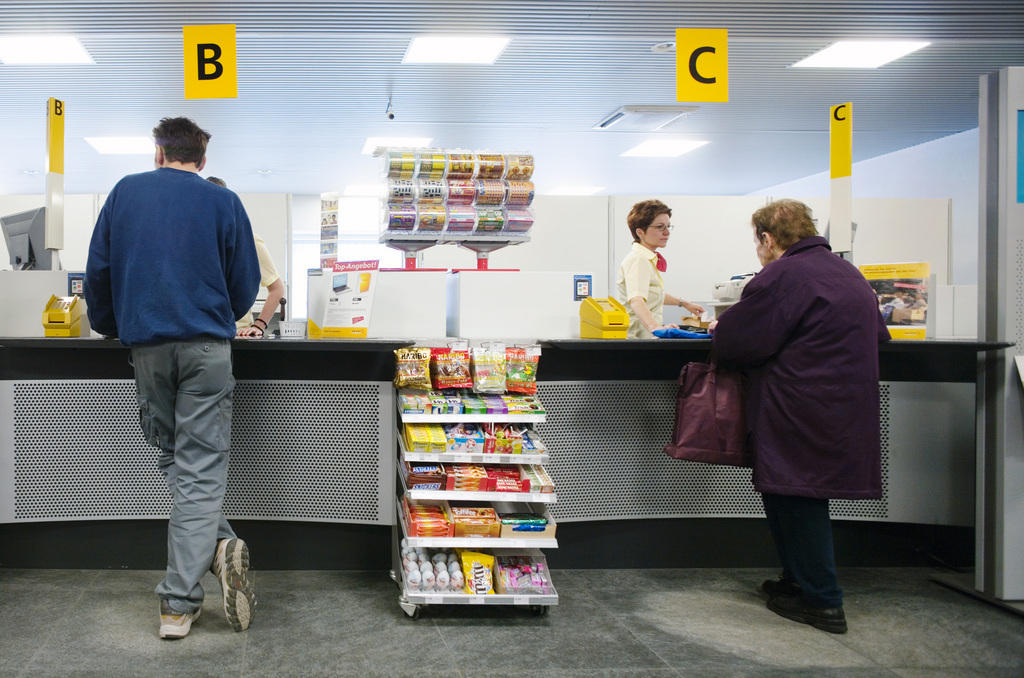Swiss among European leaders for post office closures

The Swiss Post’s announcement to close 600 traditional post offices follows a trend across Europe, although there are marked differences between countries.
In detailed presentations released on Wednesday, Swiss Post said it “envisages a network of 800 to 900 traditional post offices by 2020”, down from the current 1,400. The exact number will depend on the outcome of discussions held with towns and cities and the nation’s 26 cantons.
“It will avoid closing post offices without replacing them and will provide alternative solutions in all cases,” said an online statementExternal link. “By 2020, around 1,200 employees could be affected by changes. Swiss Post aims to continue to avoid redundancies.”
European trend
The announcement comes at a time of major overhaul of postal services across Europe. Apart from Germany, which is a special case, the number of post offices dropped by almost 15% across the continent between 2000 and 2014. In Switzerland, the drop was 34%, which puts the county at the bottom or top of the pile, depending on your point of view.
The following graphic shows the highly differing situations across Europe.
Maintaining a traditional post office is expensive. “There are fewer transactions at the counter now but the costs remain the same,” said Matthias Finger, professor at the Federal Institute of Technology Lausanne EPFL, specialising in infrastructure policy and the postal market.
In Germany, where all the traditional post offices have been closed and replaced by retail points in other outlets, the number of postal agencies has almost doubled from 13,500 to 25,000. Post offices have therefore become less costly to run as there is no need for special infrastructure because they are generally to be found in supermarkets or petrol stations. No special staff is needed and the outlets are located in places where you already find customers.
“It’s simple: it costs less but you can get more out of it. Plus a petrol station can for example offer postal services far beyond the opening times of a traditional post office. Studies in Switzerland have shown that people like this, especially because of the hours,” Finger said.
But the situation is different in other countries with a rise in post offices, like France and the Netherlands. In France, state intervention has ensured traditional post offices have remained open.
“Following the wishes of the government, the French post office has really developed its financial services, which, compared with the banks, offer more advantageous conditions. There are also subsidies for post offices. Officially it is not presented as such because this is forbidden under European law, but instead as money for rural development,” Finger explained.
For its part, Switzerland has started down the route of retail outlets but in a more cautious way and is “lagging behind similar countries”, he said, adding that countries like Spain and Italy had not yet taken this step, essentially for political reasons.
But despite the fall in the number of traditional post offices, the Swiss can still count on a fairly extensive postal network. In 2014 there was one office or outlet per 3,540 inhabitants. In neighbouring Austria, whose geography is similar to Switzerland, the proportion was one outlet per 4,582 inhabitants. Only a few other countries, including Germany, have wider coverage.

In compliance with the JTI standards
More: SWI swissinfo.ch certified by the Journalism Trust Initiative













You can find an overview of ongoing debates with our journalists here . Please join us!
If you want to start a conversation about a topic raised in this article or want to report factual errors, email us at english@swissinfo.ch.